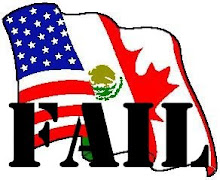Oh poor Derrick Anderson. He went to the Minneapolis area to buy a cheap car, came back to the Canadian border and lied about how much he actually paid for it to avoid paying extra money in duty and taxes (y’know, THE LAW). (Click here to read the Winnipeg Sun article)
A CBSA officer then went into his new car, found his cell phone, and proceeded to read his text messages; one of which showed the actual price he paid. With this new info, the poor lad had to come up with $5100 on the spot to cover the tax and other fees…a call to Daddy helped out.
Now he and his father are making an issue out of this in the local media, admitting that Derrick lied but focussing on the “invasion of privacy” from the border guard rifling through his text messages.
I’m not really going to comment on the fact that this guy is a loser for trying to mask his attempt at fraud by saying it was an “error in judgement”. You want to go to the US and get cheaper products, fine. But don’t try to screw over the Canadian economy that so richly provides you with, among other things, free health care by not paying your fair share of taxes at the border. Even with the $5100 tax tag applied, I’m sure the car was still cheaper than purchasing it up here.
Instead, let’s focus on the privacy concern. Did the CBSA officer have the authority to search the cell phone? According to the CBSA spokesperson, yes:
CBSA regional spokeswoman Lisa White said the federal Customs Act’s Section 99 allows border personnel to look closely at a wide range of possessions in vehicles.
“And that also includes examination of electronic devices such as laptops, cellphones and iPods,” she said. “These searches are authorized by law.”
That’s right folks, the Canadian Border Services Agency has full authority to examine what’s on your laptop, cell phone, external hard drive, etc. How do you think they catch those guys with child porn?
Not sure why this should be a surprise since the US instituted a similar directive last year. Still, a refresher might be in order.
If you leave Canada and try to return, realize that any aspect of your trip and/or possessions can be scrutinized by our own border guards. Just because you’re Canadian doesn’t mean you just get a free pass back into the country. I gave some travel tips in the link I just posted above, but let me add a few others.
Password Protect Your Data
Set your cell phone to require a password, same with your laptop and anything else. Now, this won’t prevent a search, but at least you’ll be aware of any searches that could occur.
Don’t Communicate What You Don’t Want Seen
Anything that could be searched, like text messages, email history on your laptop or files, etc. are all searchable by border guards on both sides of the US/Canada border. You don’t want it searched, don’t bring them or delete them from your device before you hit the border.
Our personal privacy does not extend to re-entry into the country, right or wrong. It’s the game that we’re forced to play, so know the rules before you play (and be aware of the consequences if you try to cheat).



